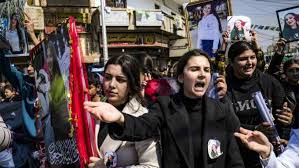A recent decision by Syria’s Ministry of Foreign Affairs to establish a new body—officially named the General Secretariat for Political Affairs—has ignited sharp debate over its role and purpose, with critics warning it could become a tool to restrict political freedoms in a country still reeling from decades of authoritarianism.
The Secretariat, announced in Minister Asaad al-Shibani’s Decision No. 53 on 27 March, is described by the government as an institutional step to organise political activity and streamline official political conduct in the post-revolution transitional phase. The Ministry insists it is part of broader reforms following the constitutional declaration issued on 13 March and the appointment of Syria’s first technocratic government.
Scope and Authority
According to the decree, the Secretariat will oversee domestic political activities, participate in formulating national policies, and manage the assets of the dissolved Ba’ath Party and former ruling coalition, the National Progressive Front. The body has been granted an independent budget under the Ministry of Foreign Affairs and is subject to standard oversight.
Despite these formalities, civil society actors and legal experts have voiced alarm. Many view the decision as a legally questionable overreach and an attempt to centralise control over political life under a new label—effectively reviving mechanisms of political suppression used by the previous regime.
Legal Concerns and Warnings
Legal expert Abdulrahman al-Sheikh Ali acknowledged that the transitional phase requires structures to coordinate policy and dismantle Ba’athist influence. However, he warned that the creation of the Secretariat violates the legal limits of the Ministry’s authority as outlined in Decree No. 20 of 2016, which defines the scope of ministerial responsibilities.
He further pointed out that despite the formal abolition of Article 8 of the old constitution—which enshrined the Ba’ath Party’s leadership over state and society—Ba’athist dominance remained entrenched. In the most recent parliamentary elections in 2024, over 68% of elected members were affiliated with the deposed president’s party.
Other experts went further in their criticism. Political researcher Ayman Abu Hashem told Al-Modon that Decision 53 directly contradicts key provisions of the constitutional declaration, especially Articles 13 and 14, which guarantee freedom of expression, political participation, and the right to form parties and civil society organisations.
“If the Secretariat were truly necessary,” he said, “it should fall under the jurisdiction of other ministries, such as Social Affairs and Labour—not Foreign Affairs.” He added that its broad and undefined mandate opens the door for unchecked power and political interference.
Fears of a New One-Party Dominance
Abu Hashem expressed concern that the Secretariat could evolve into a de facto gatekeeper over political activity, leading to the resurrection of a new ruling party under a different guise. “This would undermine the very essence of pluralism,” he noted, “especially when Syria is in dire need of encouraging broad-based political engagement.”
Women’s rights activist Hiba Ezzedine, director of the NGO Justice and Empowerment, echoed these concerns. “The Secretariat effectively gives the Foreign Ministry a supervisory role over all political movements in Syria,” she said. “This resembles the days of the emergency law, when the state used the pretext of ‘national security’ to suppress any political or social mobilisation.”
Ezzedine also warned of a coordinated effort to restore Ba’athist influence through the management of dissolved party assets, a move that could skew future political balances and stifle emerging civic forces.
Backsliding or Oversight?
The establishment of the Secretariat comes just two months after the Victory Conference on 30 January, during which the Ba’ath Party and its allies were officially dissolved and barred from reorganising in any form. At the time, military authorities declared the confiscated assets of these parties to be state property—describing them as the “legacy of the previous regime.”
In this context, critics argue that the Secretariat risks reviving that legacy in a more institutionalised form. While the government frames the decision as administrative housekeeping and political coordination, opponents fear it signals a potential backslide into old authoritarian practices.
As Syria navigates its fraught political transition, the creation of the General Secretariat for Political Affairs may well become a litmus test for whether the new leadership is serious about democratic reform—or merely reshaping control under a new banner.
This article was translated and edited by The Syrian Observer. The Syrian Observer has not verified the content of this story. Responsibility for the information and views set out in this article lies entirely with the author.


